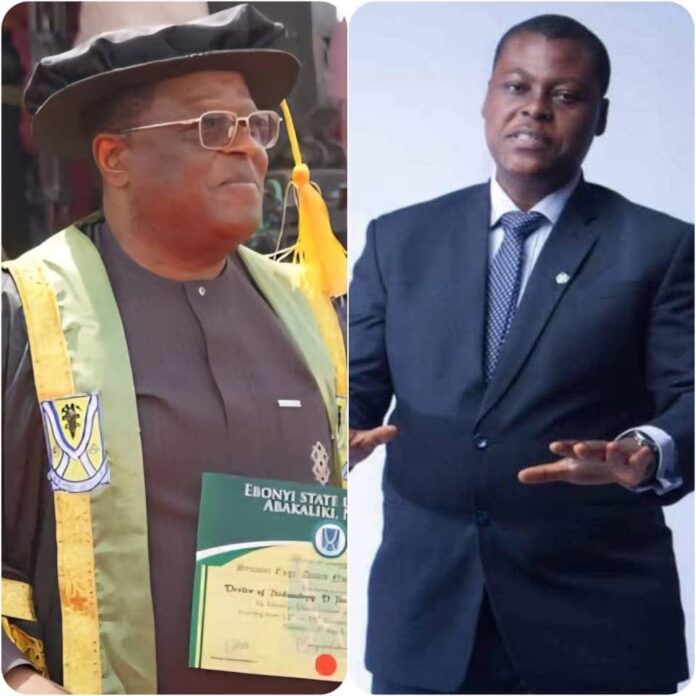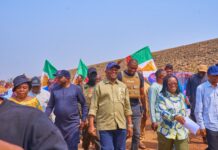Umahi, Rufai
By Ik Ogbonna
In the dynamic landscape of Nigerian media, few figures embody the spirit of confrontational reporting as vividly as Rufai Oseni. As a co-host on Arise TV’s Morning Show, Oseni has carved out a niche for himself through a style of journalism that prioritizes aggressive questioning and unyielding scrutiny of those in power. This approach, often labeled as adversarial journalism, involves challenging authority figures to uncover truths, expose inconsistencies, and demand accountability, even if it leads to heated exchanges. While critics decry it as rude or unprofessional, supporters hail it as a necessary antidote to complacency in a nation grappling with governance challenges.
Rufai Oseni did not follow the conventional path into journalism. Born and raised in Nigeria, he studied Animal Anatomy and Physiology at the Federal University of Agriculture in Abeokuta, a far cry from the typical communications or mass media degrees held by many in the field. Despite this, Oseni transitioned into media through his charisma and public speaking skills. He is a multifaceted professional: a TV presenter, radio personality, public speaker, on-air personality (OAP), writer, and philanthropist who has established centers like the Oseni Centre in Odogbolu, Ogun State.
Oseni’s career gained prominence at Arise TV, where he co-hosts programs that delve into political and social issues. He has been a featured speaker at prestigious institutions, including Ivy League universities like Cambridge, showcasing his global reach. However, his non-traditional background has fueled debates about his journalistic credentials, with some labeling him a “partisan journalist” or opposition figure rather than an impartial reporter. Oseni himself has addressed such criticisms, emphasizing his commitment to facts and accountability over neutrality, which he views as a “farce” in media.
Adversarial Journalism as practiced by Oseni, is characterized by a combative style that treats interviews as interrogations rather than casual conversations. It draws from global examples like Evan Gershkovich of The Wall Street Journal or Glenn Greenwald of The Guardian, where journalists aggressively pursue answers to hold power accountable. In Nigeria, this “gotcha journalism” contrasts sharply with more deferential approaches, often leading to clashes with guests who are unaccustomed to such scrutiny. Oseni’s interviews frequently involve raising his voice, interrupting for clarity, and pressing on sensitive topics, which some view as rude or biased. Critics argue he argues with guests, refuses to be educated, and displays arrogance. Yet, defenders praise him for making television “fun” and challenging the status quo in a society marked by years of suppression and militarism. Oseni has turned down opportunities, such as interviewing an African president who objected to his past criticisms, to uphold his convictions. His style aligns with thinkers like Frantz Fanon, who discussed oppressed minds pandering to authority, and Oseni uses it to demand transparency without fear of political backlash.
A recent high-profile example of Oseni’s adversarial style unfolded on October 7, 2025, during an Arise TV Morning Show interview with David Umahi, Minister of Works. The discussion centered on the controversial Lagos-Calabar Coastal Highway project, a ₦15 trillion initiative plagued by questions over costs, due diligence, and route adjustments.
The exchange quickly escalated. Oseni pressed Umahi on specifics, such as the cost per kilometer and why soil tests were ongoing post-award. Umahi, a former Ebonyi State governor and self-proclaimed professor, responded defensively, accusing Oseni of misrepresentation and claiming he had reported the anchor to President Bola Tinubu. Oseni retorted by asking Umahi to “keep quiet and allow me speak,” a phrase critics deemed rude. Umahi fired back with personal barbs, calling Oseni “too small” and questioning his credentials: “Who are you?”
The interview devolved into accusations of political blackmail and distractions from the project’s issues, including property demolitions and alleged illegal diversions. Umahi’s evasion of direct questions, such as the project’s total length after a presidential directive to include 100km through Edo State, highlighted the scrutiny Oseni aimed to apply.
Oseni responded on social media, defending his approach: “Journalism needs tough questions, not kid gloves—debate is messy, but truth wins.” Ogun State Governor Seyi Makinde criticized Umahi for “dancing around the figures.” Commentators like Segun Showunmi called for regulatory intervention, labeling Oseni’s style as “provocation,” while others, such as Dare Adelekan, praised it as “fearless journalism” that exposes lazy reporting.
This clash exemplifies Oseni’s adversarial brand: He transformed a routine interview into a probing session, forcing Umahi to address public concerns over a massive taxpayer-funded project. Proponents argue it aligns with global standards on CNN or BBC, where journalism serves democracy through scrutiny, not servitude. It exposed Umahi’s evasions, benefiting public enlightenment.
However, detractors highlight potential downsides: Oseni’s interruptions and tone can alienate guests and viewers, risking perceptions of bias or egocentrism. Some APC affiliates react defensively, viewing him as opposition-aligned, which could undermine media credibility. The backlash, including protests, underscores how his style polarizes, potentially inviting regulatory scrutiny.
Rufai Oseni’s brand of adversarial journalism, as illustrated by his clash with Umahi, challenges Nigeria’s media to evolve beyond deference to power. In a country where accountability is often elusive, Oseni’s unapologetic pursuit of truth—despite controversy—serves as a reminder that journalism’s role is to inform and inflame debate when necessary. Whether viewed as a hero or a provocateur, his impact is undeniable: He has made accountability a spectator sport, pushing both leaders and fellow journalists toward greater transparency. As Nigeria navigates its democratic journey, voices like Oseni’s ensure that power is never taken for granted.







